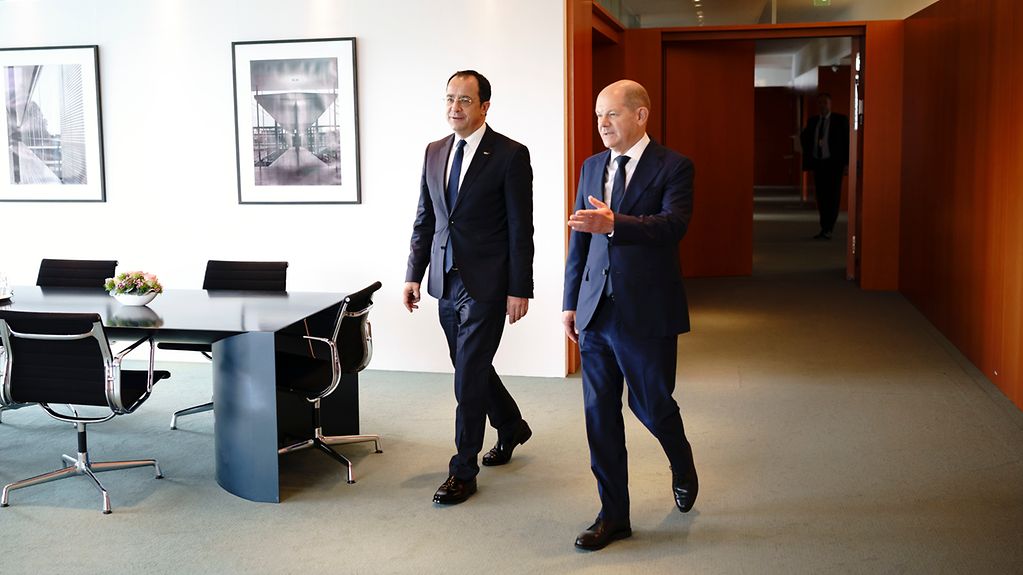Cypriot President in Berlin
Germany and Cyprus want to intensify their cooperation going forward, for example in the areas of climate protection and defence policy as Federal Chancellor Scholz said at his meeting with Cyprus' President Christodoulides in Berlin on Wednesday. "Both our countries will stand by Ukraine," said Scholz.
2 min reading time

Federal Chancellor Olaf Scholz met with the President of the Republic of Cyprus, Nikos Christodoulides, at the Federal Chancellery.
Photo: Federal Government/Kugler
"Germany and Cyprus have a lot in common both in terms of our bilateral relations and within the European Union," said Federal Chancellor Olaf Scholz during the inaugural visit of the President of the Republic of Cyprus, Nikos Christodoulides, to the Federal Chancellery in Berlin on Thursday, "which is why we want to collaborate even more closely on issues such as climate protection, energy supply and defence cooperation going forward."
Nikos Christodoulides was born in Geroskipou in 1973. He was sworn in as President of the Republic of Cyprus in February 2023.
Cyprus conflict: courage needed
One important topic of discussion was how to resolve the Cyprus issue, i.e., the conflict that has effectively divided the Mediterranean island for decades. Germany, Scholz said, continued to be in favour of a solution in which Cyprus would become a federal state comprising two zones and in which both ethnic groups, the Greek and Turkish Cypriots, would be represented in the state government.
Certain United Nations resolutions, he said, would provide the basis for such a compromise. "This being the case," the Federal Chancellor continued, "I would like to see the stalled negotiation process finally gain new momentum, which will require political courage on the part of all parties involved." Germany, he added, wished to contribute to increasing the trust between the two ethnic groups and, if desired, would also support the United Nations negotiation process.
Developing good neighbourly relations
Also on the agenda was the situation in the Eastern Mediterranean. Federal Chancellor Scholz acknowledged the region's "great economic potential". The opportunities for regional cooperation on energy issues were good, he said.
Therefore, he continued, good neighbourly relations were in the interest of all neighbouring countries, who could work together to make full use of this potential for the benefit of their respective populations. "I am convinced," Scholz said, "that the current issues in the Eastern Mediterranean region can be resolved through dialogue and on the basis of international law." Ultimately, he added, that the relationship between Cyprus and Turkey was important for the whole of Europe.
Standing shoulder-to-shoulder with Ukraine
In relation to the current major challenges facing Europe, Federal Chancellor Scholz and President Christodoulides also discussed Russia's attack on Ukraine. "Together with our partners in the EU," he said, "Germany and Cyprus are standing shoulder to shoulder with Ukraine and we will not waver in our support for Ukraine neither politically, financially, in terms of humanitarian aid nor arms deliveries."
Scholz emphasised the fact that sanctions pressure against Russia was to be further intensified and, in particular, that steps would be taken to ensure that Western sanctions were not circumvented.